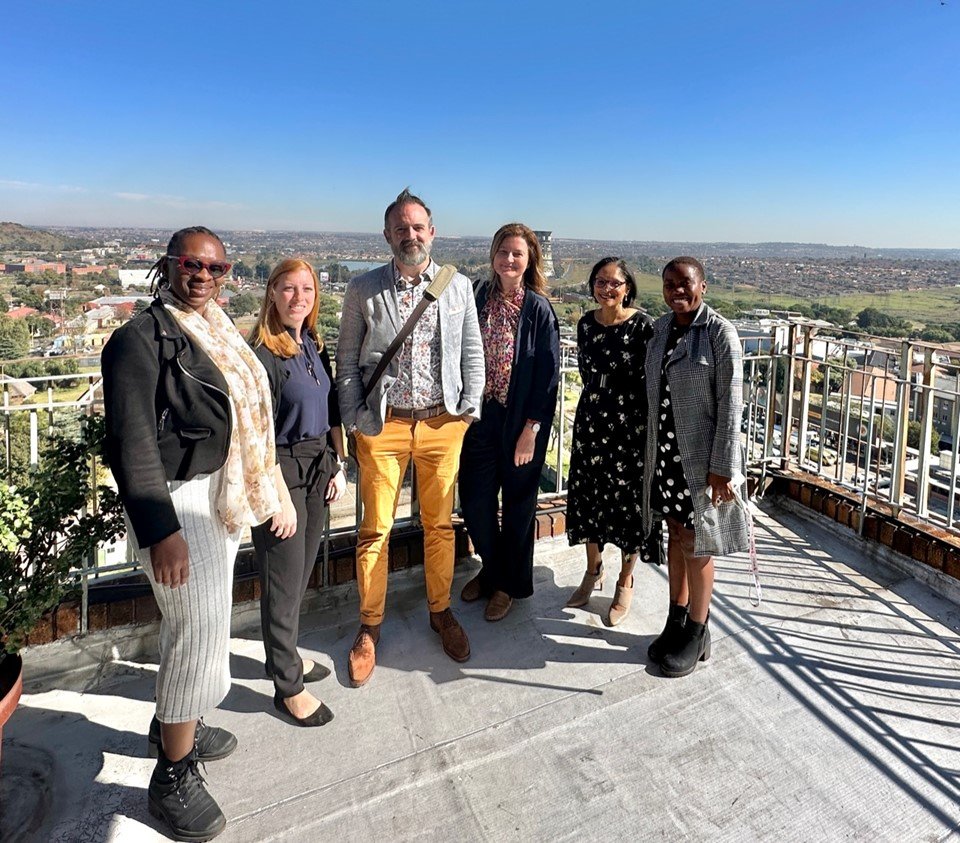|
COVID-19 (2022 Deadline)
YouthCAN - Co-design African Needs: Exploring strategies to increase the uptake of a SARS-CoV-2 vaccine in youth: a co-designed study with youth
PI: Janan Dietrich (dietrichj@phru.co.za), Perinatal HIV Research Unit, Division of the University of the Witwatersrand
U.S. Partner: Avy Violari, Perinatal HIV Research Unit, Division of the University of the Witwatersrand (funded by National Institutes of Health)
Project Dates: September 2022 - March 2024
Project Overview
 | | Staff from USAID (Brent Wells, Melissa Trimble Bressner) and NAS (Lina Stankute Alexander) visit Dr. Dietrich's team at PHRU, South Africa, May 2023 |
Less than 30% of the South African population had received a COVID-19 vaccine as as of February 2022, and just under 1.3 million South African children aged 12-17 years had been vaccinated. Although much work has been conducted to understand vaccine hesitancy and misconceptions among South African adults, the youth voice has largely been neglected. Prompted by conversations with young South Africans, this PEER project entails three linked objectives, informed by continuous consultation with a youth-led community advisory board. The project sought to better understand how information about COVID-19 is accessed to circumvent vaccine hesitancy in young people and understand and explore ways to increase the uptake of a SARS-CoV-2 vaccine, while identifying ways to offer tools and resources to build resilience against economic and emotional toil of the pandemic. The final output was an intervention co-designed with youth to support vaccination rates in adolescents and young adults.
Final Summary of Project Activities
The PEER team conducted two transect walks in Soweto, South Africa, in collaboration with Adolescent Community Advisory Board (ACAB) members. These walks helped familiarize researchers with the study area and allowed them to observe the resources available in each community that could affect vaccine uptake. The researchers subsequently conducted community outreach and convened eight focus groups of residents ages 15-24 between two sites in Soweto. One was an urban area, Diepkloof, and one was an informal settlement area called Motsoaledi. The focus groups were stratified by ages 15-19 and 20-24 and male and female groups. During the focus group discussions, the team explored young people’s thoughts, experiences, and perceptions of the COVID-19 pandemic and the COVID-19 vaccine. They also explored participants’ thoughts on youth inclusivity, as well as campaigns and strategies they thought would work to get youth involved in decisions and conversations about important procedures should a future pandemic occur again.
Community leaders in both sites were interviewed to understand their experiences on the ground about the pandemic, as well as the wider community’s views on the COVID-19 vaccine. The project team contacted primary and secondary stakeholders via email to inform them about the project and how they could be involved with the research results, promoting communication and engagement with stakeholders to create awareness on the research project.
The researchers also conducted a mobile online survey of 532 youths. Questions included socio-demographic information, knowledge of COVID-19, sources of COVID-19 information, COVID-19 anxiety, and experiences of lockdown measures. The team also led six workshops with youth to co-design interventions and strategies for uptake of future vaccines amongst youth. This intervention was focused on broad objectives identified from the PEER research as areas that affected vaccine hesitancy and uptake among youth, specifically effective communication tools for health information and actions the government could take to build trust.
The team presented their initial findings at Johannesburg Research Day 2023, as well as to the Rena le Lona Creative Centre for Children and the Diepkloof Learning Center, developing new relationships with local NGOs. They also conducted a community engagement meeting where study results were shared with key influencers in both communities for their feedback and input. The PI was awarded a $500,000 grant from the Vaccine Confidence Project to continue her research strategy and develop new work focused on economic empowerment opportunities for young adults in the study areas. Several academic manuscripts are forthcoming.
Back to PEER COVID-19 Grant Recipients
|
|
|
|




